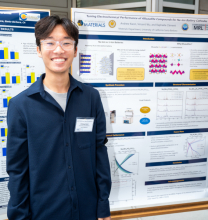
Major:
University:
Mentor(s):
Faculty Sponsor(s):
Faculty Sponsor's Department(s):
Project Title:
Project Description:
Sodium-ion batteries are primary candidates to replace traditional Li-ion batteries, due to the lower cost and greater abundance of sodium resources compared to that of lithium. Polyanionic materials are a promising class of cathode materials for Na-ion batteries due to their high stability and large open framework which can better accommodate larger Na+ ions. As a subset of polyanionic materials, the alluaudite structure is a relatively unexplored but promising class of materials with potential to perform well as Na-ion cathodes. They take on the general formula Na2M(1)2M(2)(XO4)3, where M is a transition metal and X is an anion. In this study, a series of phosphovanadate alluaudite compositions Na2Mn3(PO4)3-x(VO4)x and Na2Mn3-yAly(PO4)3-x(VO4)x were investigated. Varying the phosphate to vanadate ratio enables tuning of the electronic and ionic conductivity, along with the operating voltage of the cathode materials. Additionally, doping with redox-inactive aluminum at the transition metal site may further improve electrochemical performance. The alluaudite compositions were synthesized via a solution-assisted solid-state synthesis method at varying calcination temperatures to determine optimal synthesis conditions. Powder X-ray diffraction was utilized to confirm that phase-pure compounds were synthesized for each composition. Finally, samples were electrochemically tested to evaluate their performance as cathode materials. Overall, we hope to engineer a better cathode material for Na-ion batteries via compositional tuning of the alluaudite chemistry.
